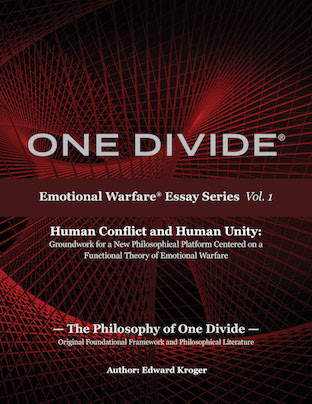Emotional
Warfare®
Essay
Collection
By Edward Kroger
The Emotional Warfare® Essay Collection gives the highly motivated individual, advanced psychologist, philosopher, academic or scholarly researcher technical background and philosophical grounding helpful for approaching One Divide's Emotional Warfare educational platform and book series, which provide an analytic and practical philosophy for human unity and the reduction of conflict.
It also expands on the platform in a manner that gives additional philosophical/academic defense of the material and explores its connection to theories that readers with an advanced background in philosophy or psychology will be familiar with.
These essays address the information required of a platform to move through the various levels of discourse to span from metatheoretical to clinical utility and, equally, toward practical and socio-political application.
They also reflect the organic epistemological position, remaining open to improvement and/or articulation of the Philosophy of One Divide’s supporting concepts and principles and theoretical framework of Emotional Warfare and its Pattern(s). Most importantly, this format allows the Essay Collection to provide an extensive, but not exhaustive, meta-perspective and deeper dive into the original foundational framework and philosophical literature of the Philosophy of One Divide and theory of Emotional Warfare established in the treatise on Emotional Warfare Books 1–5.
As noted on One Divide’s Presentations page, sections of content provided in the Essay Collection, Vol. 1 have been modified, with minor revisions, for visiting scholar lecture series, official paper presentations and keynote symposiums featuring Edward Kroger, founder of the Philosophy of One Divide and theory of Emotional Warfare, at academic institutions and professional or scholarly conferences.

-
Book No. 6

An assessment and analytical overview of human nature and human psychology as laid out in the original foundational framework and philosophical literature of One Divide and the theory of Emotional Warfare.
Groundwork to a New Philosophical Platform Centered on a Mechanistic-Functional Theory of Emotional Warfare
— The Philosophy of One Divide —
A Refinement of the Original Foundational Framework and Philosophical Literature
Emotional Warfare® Essay Collection Vol. 1
Human Conflict and Human Unity
Vol. 1
Key Points
The Emotional Warfare Essay Collection, Vol. 1 provides overarching insights and theses designed for the motivated individual or researcher desiring a deeper dive into the original foundational framework and philosophical literature of the Philosophy of One Divide. Note: Traditional foundational arguments to the Philosophy of One Divide and theory of Emotional Warfare are found throughout the book series.
- Rooted in analytic and practical philosophy, the One Divide/Emotional Warfare groundwork bridges naturalistic accounts and moral living.
- It establishes a contemporary metaphilosophical approach and methodology aimed at centralizing key concepts and meanings common to various philosophical-psychological domains dealing with the nature and possibility of knowledge and understanding (extending to metaphysics, epistemology, ontology, logic, ethics, etc.).
- It establishes a unique universal and unified methodology and language system built on category theory, common-sense propositions, and formal logic that transcend Wittgenstein’s language game.
- It illuminates the nature of human division, i.e., human conflict, by identifying Patterns of Emotional Warfare on both the interior emotional or intrapsychic level and the interpersonal or intersubjective level.
- It provides a multilevel definitional framework of Emotional Warfare, allowing for multiple macro classifications of Emotional Warfare, its Pattern(s), and its underlying or micro subpatterns, e.g., molecular or biological issues, providing multiple entry points into the One Divide/Emotional Warfare platform.
- It applies to the nature of mental health and mental illness, including both nonpsychotic and psychotic afflictions.
- It is a psycho-educational (and psychotechnical) platform and language system designed for human transformation and human knowledge that extends from the individual to the collective human society.
- It resolves the dichotomy between individualism and collectivism and between the approaches of humanistic and social psychology.
- It provides unique algorithmic sequencing and algorithmic information essential to pattern identification, processing, and recognition of Emotional Warfare and the interplay of its Patterns.
- It advances traditional platforms and psychologies (including social and humanistic) while remaining consistent with modern theory and practice in both philosophy and psychology.
- It specifically advances Donald Winnicott’s false-self disorder.
- It addresses how the notions of causation, agency and efficacy, and free will are central to both the psychological organization of the human person and the psychosocial architecture of political society.
- It provides a metaphysical-to-clinical explanatory ladder and a cogent theory of causation to all human conflict.
“New, provocative way to look at the underpinnings of human behavior”
There is a special delight in discovering a new way of looking at something familiar, such as seeing the two faces in the silhouette of a vase, or puzzling through Schrödinger's thought experiment about a box containing a cat that is both alive and dead. Edward Kroger gives us that kind of new, provocative way to look at the underpinnings of human behavior — both individual and social — in his “One Divide” writings on what he terms “Emotional Warfare.”
His thesis both builds upon traditional notions about philosophy and psychology and takes a fresh and novel approach to the continuing puzzle of what makes us tick. He challenges us with questions about the sources of autonomy, discord and morality, and whether we really desire peace, equality and manipulation-free relationships.
Mr. Kroger then steps beyond his explorations of the foundational reasons for how we interact, to offer a set of practical, hands-on precepts, tools and strategies for improving those interactions and reducing human conflict. Not surprisingly, his approach has attracted serious attention from professionals struggling to find ways to understand and ameliorate antisocial behavior.
His work is not for the casual browser, but it is well worth the time and attention it requires.
Alexander Auerbach
Alexander Auerbach is a communications consultant and journalist. Formerly with the Los Angeles Times and Boston Globe, Mr. Auerbach now advises corporate clients and is the publisher of “The Profit Chain,” an online business magazine.